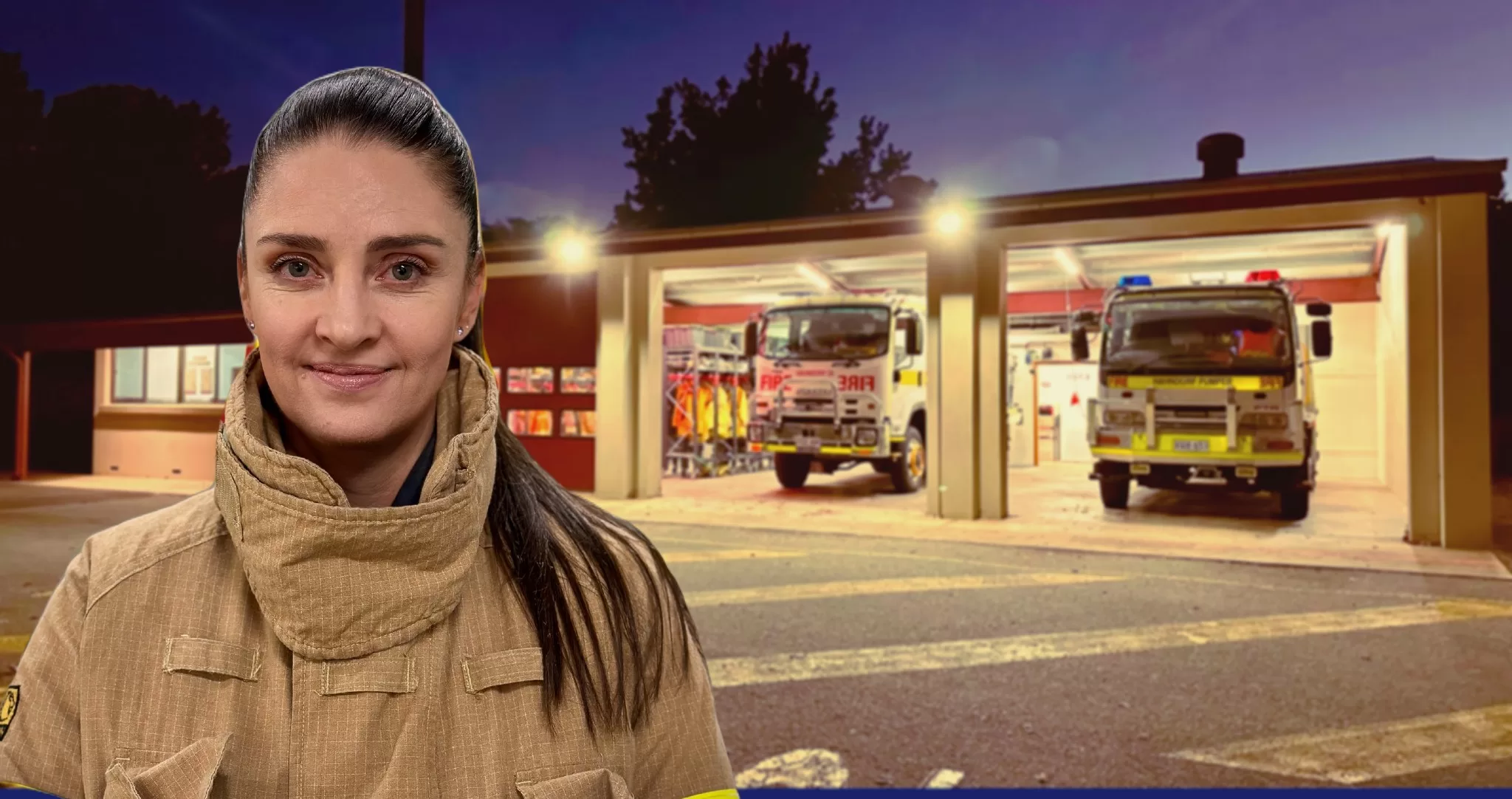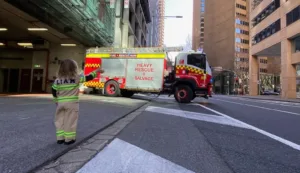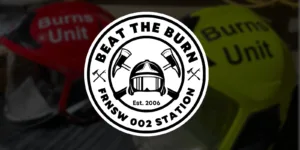Firefighting is an industry that demands courage, resilience, and a profound commitment to community safety. We had the chance to speak with newly appointed Country Fire Service (CFS) Captain, Ros, as she shared her journey, her approach to leadership, and the challenges and rewards that come with the role of a captain. For those aspiring to rise as leaders within the firefighting ranks, this is an essential read, filled with truly exceptional advice.
Table of Contents
Tell us about your background and what inspired you to pursue firefighting.
I have always had a deep interest in natural disasters and emergency services, right from when I was a child. In an ideal world, I would have made a career out of it, but circumstances just didn’t allow for it. Six years ago, I immigrated to Australia from South Africa and decided I would try to make emergency services a part of my life. Career-wise, I became a police officer, but I also wanted to volunteer somewhere.
Doing risk analysis is just part of my nature, so when I arrived in the Adelaide Hills, I researched what the biggest threat to myself and my family would be. Bushfires obviously came out tops, and having come from a major city, it was a threat I was completely unfamiliar with. I decided the best way to mitigate this risk would be to join the CFS. I also volunteered with an international humanitarian aid agency, so between my career and volunteer work, I have learned a tremendous amount in respect of disaster management, education, response, relief, and recovery work, specifically with bushfires. However, I’m still learning!
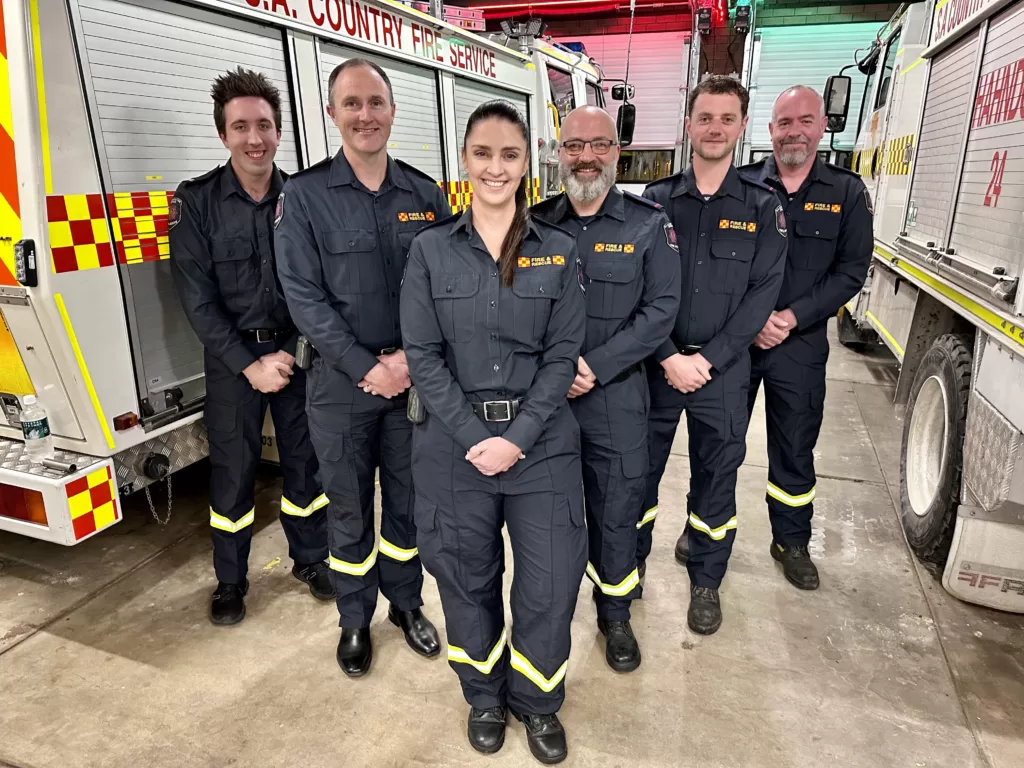
What does a typical week look like for you in your role as a captain? What keeps you on your toes?
Previously, I’ve held the positions of Brigade Administration Coordinator and Brigade President, so CFS has already been a daily part of my life for the last 6 years! No week is ever the same, and as I work shifts in my ‘day job’, no day is the same. However, I try to remain on top of my commitments by setting aside a couple of hours every single day to deal with things that inevitably crop up. Sometimes that is at 1500 hrs, other times at 0300 hrs! Unless I am working, Monday night is always training night, and I generally have at least one evening meeting per week. I take these meetings seriously and will sometimes spend many hours preparing for them. Our members time is valuable, and those who attend these meetings deserve to have their time respected.
My main priority is always the members of the brigade. Their wellbeing is paramount to me, and I want to ensure that we have a brigade where they feel welcomed, respected, and supported—always. I make an extra effort to support our newer members, as I know what it feels like to be completely clueless in those first few months and years! I also have a special interest in helping our younger female firefighters, and I hold separate training nights for them whenever possible. Sometimes we just need to have a space where we can talk openly about some of the challenges we face and be there to work through them together.
What keeps me on my toes, I guess, is a genuine desire to always improve my own knowledge and skills, but to extend that out to my brigade as a whole. We have some incredibly dedicated volunteers, and I feel I owe it to them to constantly reflect on what I can do to improve the way I lead and what I can do to support them in their own growth as firefighters and leaders.
Can you share some of the most rewarding or challenging moments you’ve experienced?
CFS has been such a rewarding experience for me on so many levels. As a basic, it has provided me with a community, a ‘family’, and a support network. It has pushed me completely out of my comfort zone and forced me to step up into the unknown on many occasions. I have learned so many transferrable skills that I’ve carried into other aspects of my life. The camaraderie I feel with other firefighters, whether local or on deployment, is completely unique to anything I have experienced in my life.
In regard to being a leader in the brigade, I find it incredibly fulfilling to see our members confidence and skills increase. Like those members who start off shy and hesitant but then step up into that front left seat for the first time. The exhilaration on their faces and the ‘high’ they are on for days afterwards are just inspiring!
The biggest challenge, I would think, would be overcoming my own lack of confidence. There was a huge learning curve for me just understanding the very basics of bushfires and volunteer firefighting in Australia. It was just not part of my background or knowledge base. So to go from not knowing anything about anything to being captain within 6 years, I have often questioned whether I have the right skills to be in this position!
Letting go and learning to delegate more is also a constant challenge for me. I am very passionate about what we do and always want to be involved with everything, even when I know I don’t need to be. However, I work with a fantastic team, and they frequently tell me outright to hand it over. It’s a work in progress!
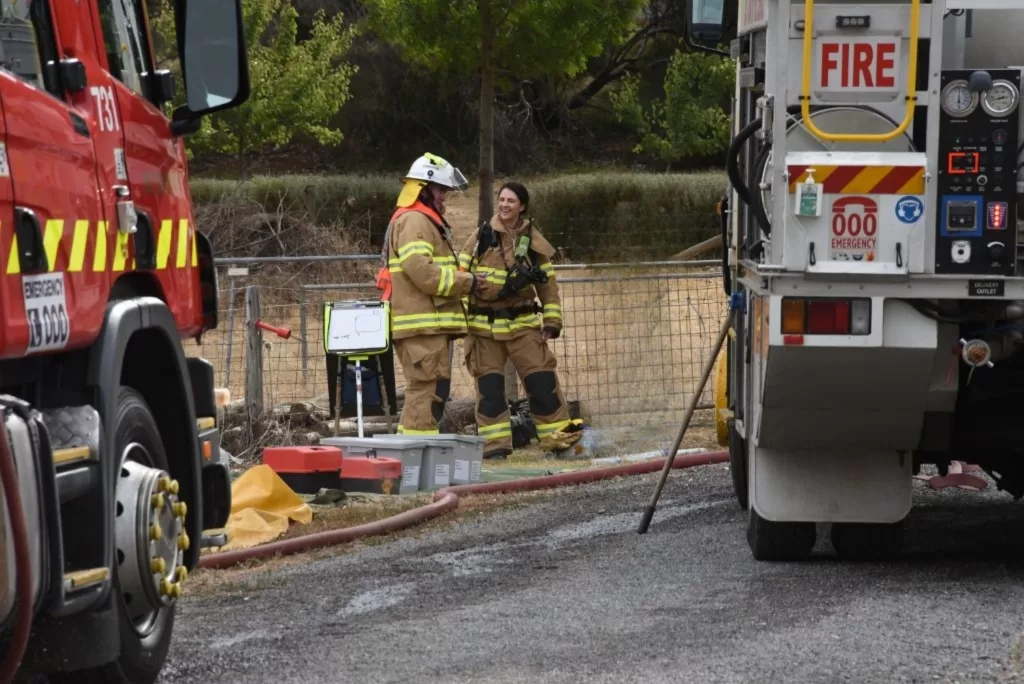
How do you maintain your personal well-being while leading your team effectively?
Working as a response cop, the demands I face in my career are very closely mirrored in the CFS. It requires that you are always acutely aware of where you ‘are’, and how that impacts your ability to respond to emergencies. Having lived in South Africa for over 40 years, I have a fairly solid understanding of trauma and stress, and I have tried to use all those negative experiences to understand my own capacities better. I know my own personal warning signs. Something as simple as becoming forgetful or making ‘silly’ mistakes is a huge sign for me now. As soon as that happens, I force myself to take a step back. Usually, within 2–3 days, I am recharged and ready to carry on again!
Going to the gym regularly to maintain my fitness is important to me (as shifts allow). I also love going for long meandering walks, where I use the quiet time to process incidents I’ve attended (both work and CFS), analyse my own response to situations, and plan what and how I can make improvements within the brigade.
What leadership style do you employ to motivate and guide your team, especially during high-pressure situations?
I think my approach to leadership would be a combination of a coaching and servant leadership style. I tend to remain pretty calm under pressure, and I certainly am not the sort of person to scream and yell at everyone on the fireground. My drive is to motivate and empower all our members to keep pushing through their own personal limits and to give them the support and encouragement to do so. Having said that, everyone needs to be accountable for themselves, and if someone is unable or unwilling to meet their commitments, then they need to take a step back for a period. As I keep saying to the members, we are not a social club or a sporting club. Our actions, or inactions, can have life-changing consequences not only for us but for our whole community. I will always be willing to work with someone who wants to learn and who needs extra guidance, but my patience does not extend to those who lack commitment and self-awareness!
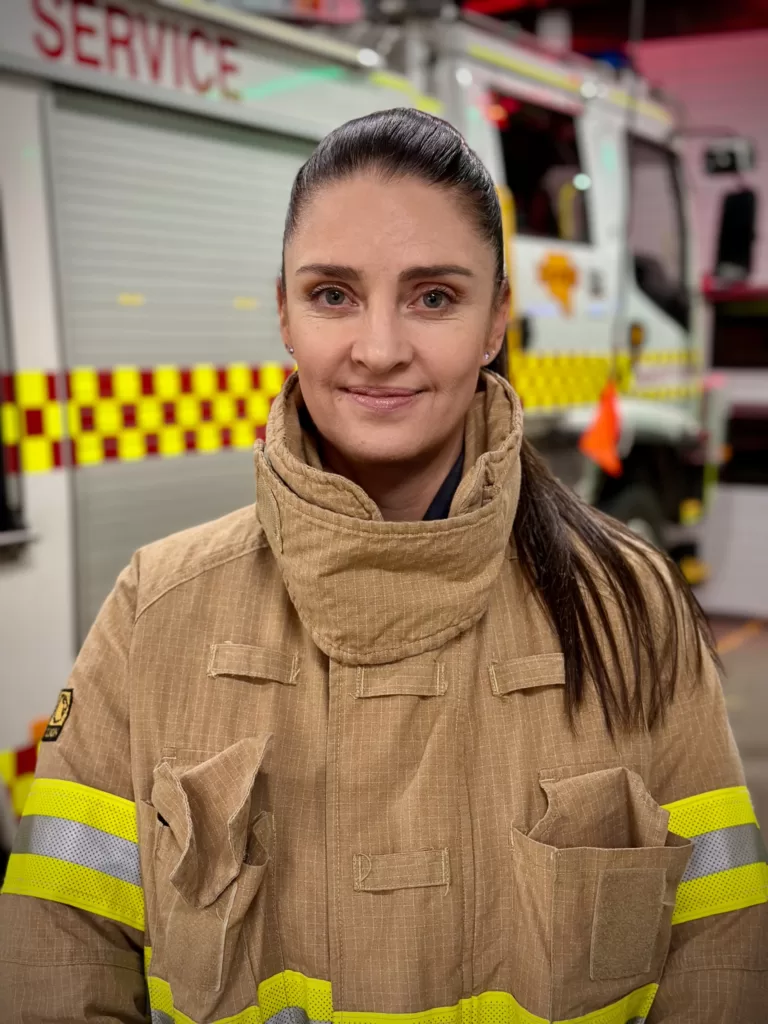
Could you tell us about a particularly memorable or challenging incident in your career?
It would be hard to pinpoint one specific incident, as so many have been memorable for many different reasons. That first going fire where you eagerly jump off the truck, take a deep breath, and realise it’s almost impossible to breathe – the first home you see is engulfed in flames, knowing there is nothing you can do to stop it. Seeing animals burn and having to just walk away, watching people’s homes, livelihoods, and lives change in front of your eyes, and being helpless to assist. Feeling the fear, but running towards the danger, not away from it. These, and many others, are very impactful moments for me. It reminds me constantly of not only the risks we take but also the rewards – those times we can save a property, an animal, or even a fence on a rural property. The privilege of knowing that you stand together supporting another human being, if only for a few minutes, on what could be the worst day of their life. Every single one of these memories has a lasting impact on me and influences how I react to the next incident.
How do you see the future of firefighting evolving, and what are your goals for your team and station in the coming years?
Not having had a long history with volunteer firefighting, I only have my observations of how I believe it used to be and where it is evolving. For starters, it has become a lot more centralised, and I can only see this continuing. The benefits of this are clear—increased professionalism, support, access to resources, and ensuring there is a standard we all subscribe to. But this increase in professionalism does require increased commitment from members and a higher level of accountability. Getting the balance right with our expectations of volunteers is incredibly tricky, and I think the leadership of every brigade understands that. The job needs to get done, irrespective of whether the responsibility is shared between five people or 50 people.
My goal has always been to create an environment where our operational members are mentored on an ongoing basis within a structured programme. This includes both operationally and with management and leadership skills. By mentoring individuals, we not only empower them but also help distribute the workload of the brigade. It also ensures we have a succession plan in place for our future leaders within the brigade. Do we always get this right? It’s time-consuming and requires a lot of additional work from members who are already time-poor. However, I truly believe it’s worth the effort.
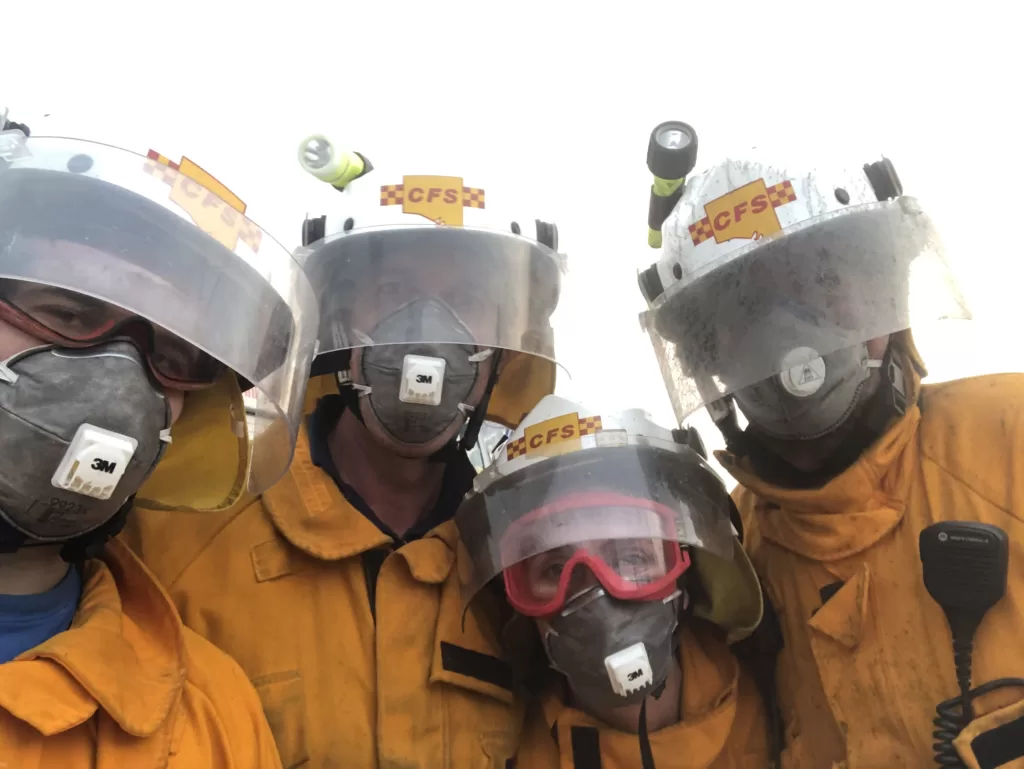
Any advice for individuals who aspire to become firefighters and work their way up to leadership roles?
There will never be a right time for firefighting. Whether it be the right time to join (we hear that regularly from prospective volunteers!) or the right time to step up into leadership, I know this from a personal perspective. If I listened to those internal voices, I would still be sitting at home telling all and sundry that one day I plan to become a firefighter! It takes bravery to step into something new, but the benefits you gain are life-changing. And when you feel like you want to step up into leadership, you need to be willing to get your hands dirty. You need to get onto the truck at 0400 hours, or when you know (yet again) it’s a false alarm. You need to be proactive, hardworking, and honourable. You need to be consistent so people can learn to trust you and know they can rely on you. And I think, most importantly, you need to remain humble and self-aware. None of us are perfect, and every leader needs to be aware of their own shortfalls. I am aware of mine (and am always discovering more!), yet I know that I am surrounded by many members within my brigade and beyond who I can call on when I need help.
Lastly, can you share a fun or heartwarming moment from your time as a firefighter that highlights the close-knit nature of your team?
This is a tricky question to answer, as it usually involves our shared, dark sense of humour and wouldn’t be suitable for a public forum! Suffice it to say, we share such a bond and sense of camaraderie, and time in the service doesn’t dictate its strength. We have new members joining, and within a few weeks, it feels like they have always been a part of the furniture! There are also members who aren’t as actively involved; however, we host regular social get-togethers and try to encourage their involvement. We know that having those solid relationships can only be beneficial in the field!

